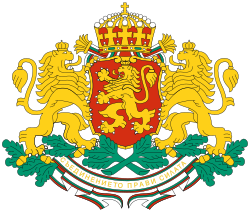Bulgarians in Croatia
 From Wikipedia - Reading time: 7 min
From Wikipedia - Reading time: 7 min
| Total population | |
|---|---|
| 350[1] | |
| Languages | |
| Croatian, Bulgarian | |
| Religion | |
| Bulgarian Orthodox (45%)Catholic (23%) | |
| Related ethnic groups | |
| Croatian Macedonians |
| Part of a series on |
| Bulgarians Българи |
|---|
 |
| Culture |
| By country |
| Subgroups |
| Religion |
| Language |
| Other |

Bulgarians in Croatia (Croatian: Bugari Hrvatske, Bulgarian: Българи в Хърватия) are one of 22 national minorities in Croatia. According to the last census from 2011, there were 872 Bulgarians living in Croatia, most of them in Zagreb.
Bulgarians are officially recognized as an autochthonous national minority, and as such, they elect a special representative to the Croatian Parliament, shared with members of eleven other national minorities.[2]
Number of Bulgarians
[edit]| Formal name of Croatia | Year | Number of Bulgarians |
|---|---|---|
| part of Yugoslavia | 1931 | 606 |
| People's Republic of Croatia | 1948 | 637 |
| 1953 | 464 | |
| 1961 | 593 | |
| Socialist Republic of Croatia | 1971 | 676 |
| 1981 | 441 | |
| Republic of Croatia | 1991 | 458 |
| 2001 | 331 | |
| 2011 | 350 | |
| (Croatian Bureau of Statistics) [1][3] | ||
2011 census
[edit]| County | Bulgarians | Total percentage |
|---|---|---|
| City of Zagreb | 120 | 42.86% |
| Split-Dalmatia | 48 | 13.71% |
| Istria | 34 | 9.71% |
| Osijek-Baranja | 26 | 7.43% |
| Primorje-Gorski Kotar | 24 | 6.86% |
| Zagreb | 16 | 4.57% |
| Bjelovar Bilogora | 12 | 3.43% |
| Brod-Posavina | 10 | 2.86% |
| Zadar | 10 | 2.86% |
| Varaždin | 9 | 2.57% |
| Šibenik-Knin | 8 | 2.29% |
| Vukovar-Syrmia | 7 | 2.00% |
| Sisak-Moslavina | 6 | 1.71% |
| Karlovac | 5 | 1.43% |
| Dubrovnik Neretva | 3 | 0.86% |
| Požega-Slavonia | 3 | 0.86% |
| Virovitica-Podravina | 3 | 0.86% |
| Lika-Senj | 2 | 1.57% |
| Krapina-Zagorje | 1 | 0.29% |
| Međimurje | 1 | 0.29% |
| Total | 350 | 100% |
| (2011 census) [4] | ||
Notable people
[edit]- Nikolaj Pešalov (b. 1970), weightlifter
- Marianna Radev (1913–1973), contralto
- Dubravka Ugrešić (1949–2023), writer, Bulgarian mother
See also
[edit]External links
[edit]References
[edit]- ^ a b "Stanovništvo prema narodnosti, popisi 1971. - 2011" (in Croatian). Retrieved 20 December 2012.
- ^ "Pravo pripadnika nacionalnih manjina u Republici Hrvatskoj na zastupljenost u Hrvatskom saboru". Zakon o izborima zastupnika u Hrvatski sabor (in Croatian). Croatian Parliament. Retrieved 2011-12-29.
- ^ Stanovništvo Hrvatske od 1931.-2001.
- ^ Popis stanovništva 2001. godine
Licensed under CC BY-SA 3.0 | Source: https://en.wikipedia.org/wiki/Bulgarians_in_Croatia39 views | Status: cached on August 08 2025 03:35:00↧ Download as ZWI file
 KSF
KSF